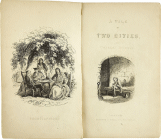
by Charles Dickens
, set in London
and Paris
before and during the French Revolution
. With well over 200 million copies sold, it ranks among the most famous works in the history of fictional literature.
The novel depicts the plight of the French peasantry demoralized by the French
aristocracy in the years leading up to the revolution, the corresponding brutality demonstrated by the revolutionaries toward the former aristocrats
in the early years of the revolution, and many unflattering social parallels with life in London during the same time period.
The Dover mail was in its usual genial position that the guard suspected the passengers, the passengers suspected one another and the guard, they all suspected everybody else, and the coachman was sure of nothing but the horses; as to which cattle he could with a clear conscience have taken his oath on the two Testaments that they were not fit for the journey.
![]()
Keep where you are because, if I should make a mistake, it could never be set right in your lifetime.![]()
For I'm the devil at quick mistakes, and when I make one it takes the form of Lead.
![]()
"What did you make of it, Tom?" "Nothing at all, Joe." "That's a coincidence, too, for I made the same of it myself."![]()
"The time was to come, when that wine too would be spilled on the street-stones, and when the stain of it would be red upon many there."![]()
Repression is the only lasting philosophy.![]()
Deep ditch, single drawbridge, massive stone walls, eight great towers, cannon, muskets, fire and smoke. One drawbridge down! “Work, comrades all, work! Work, Jacques One, Jacques Two, Jacques One Thousand, Jacques Two Thousand; in the name of all the angels or the devils – which you prefer – work!”![]()
Liberty, equality, fraternity, or death;-- the last, much the easiest to bestow, O Guillotine!
![]()

